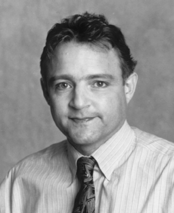

|
| Volume 49, Number 1, Spring 2000 |
by Joe Palca
 The National Association of
Science Writers and the American Association for the Advancement
of Science (AAAS) have had a long and cordial relationship. AAAS
gives out its science writing prizes at NASW's annual banquet,
and NASW holds its annual get together at the AAAS annual meeting.
Next year will be the sixtieth that NASW has been an affiliated
society of AAAS.
The National Association of
Science Writers and the American Association for the Advancement
of Science (AAAS) have had a long and cordial relationship. AAAS
gives out its science writing prizes at NASW's annual banquet,
and NASW holds its annual get together at the AAAS annual meeting.
Next year will be the sixtieth that NASW has been an affiliated
society of AAAS.
But at the AAAS meeting this past February in Washington, something happened that made me question the appropriateness of that formal affiliation. As president of NASW, I was invited to a meeting of affiliated societies to hear about AAAS' resolutions in the policy arena. Most of these resolutions did not trouble me. AAAS has a program to educate judges about science, they are active in making available materials for teaching evolution, and they are trying to help scientists around the world who are being persecuted by their governments.
One resolution was troubling. It involves modifications of the Office of Management and Budget Circular A-110. This is a document that spells out the terms under which the public may demand access to research data gathered by federally funded scientists. Recently, Congress adopted language that requires OMB to revise those rules. Specifically, sponsors of the language want to make it hard, if not impossible, for scientists to withhold their raw data from any interested party. The rule was propelled by certain industries anxious to get their hands on data used by the Environmental Protection Agency to set clean air standards, data one presumes they are interested in reanalyzing to challenge EPA's rules.
AAAS led the charge against this legislation, first seeking to have it repealed, and then, when that failed, trying to soften it by encouraging OMB to take a restrictive approach to what constitutes "data."
This was the resolution I found troubling. Although arcane to most of us, to many scientific societies and research institutions this is a crucial issue, since they feel a scientist's raw data must have some privacy protections. Whether or not I personally agree with this, as a journalist I felt uncomfortable joining an effort to block public access to federally funded research data, regardless of the motivations. I wondered whether as an affiliate of AAAS, NASW could be considered to be giving tacit support to AAAS' position. So I asked NASW board member Rick Borchelt to look into the nature of our affiliation.
Here's what Rick found. Affiliates are not bound by AAAS resolutions. These are statements made by AAAS and, according to the AAAS official who handles affiliate affairs, Gretchen Seiler, "are not construed as, and are never portrayed as, being made on behalf of our affiliates. We do share our resolutions with our affiliates and encourage them to draft their own on those items on which they share a mutual view or concern." Even if that view differs from the party line, Seiler said.
Rick says affiliation has few tangible benefits. Affiliated societies may post the times and locations of their meetings during the AAAS annual meeting in the AAAS program, and sessions sponsored by affiliated societies have a better chance of being accepted by the program committee. AAAS provides meeting space on request for a business meeting during the AAAS annual meeting, and members of affiliated societies may participate in (a very few) benefit programs like travel and such offered to members of AAAS.
On the other hand, Rick adds, there are few if any downsides either. Our only responsibilities as an affiliated society are to delegate a representative to the AAAS section and keeping AAAS informed of changes in officers. There also is an affiliates meeting at the AAAS annual meeting, and attendance of the rep at that meeting is encouraged. There are no costs to maintaining affiliation.
Given this information, I feel NASW should remain an affiliate of AAAS. So long as we retain the right to agree to disagree, I think the benefits of a cordial working relationship with AAAS are tangible, and while severing affiliation might not damage those relations, it couldn't help them. Differing opinions are welcome, and should a groundswell of protest emerge, perhaps this issue should be reopened at our next annual meeting in San Francisco. That, however, is for my successor, Paul Raeburn, to decide.
Finally, I would be remiss if I did not devote a portion of this column to a special event. This issue of ScienceWriters is the last for which Howard Lewis will be editor. I don't know much about what the news-letter was like before Howard's leadership. I do know that in the 15 years I've been reading it, ScienceWriters has been a delightful, insightful, interesting journal. It has been both the well-loved town crier and the professional sounding board for issues of broad relevance to scientists, science writers, and the public. Howard, it's been a great run. Thank you so much. I expect we'll continue to see your contributions in ScienceWriters pages. Welcome to the ranks of those underpaid scribes who have considered it an honor to contribute to your publication.
Joe Palca is currently a Kaiser Media Fellow on leave from
National Public Radio. He can be reached by phone 202-244-5693,
fax 815-371-1658, or e-mail jpalca@npr.org.